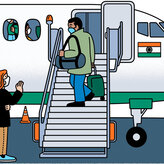|
Travelling with the elderly: Know the risks Is it safe for seniors to be travelling now? Or should the elderly hit the brakes on non-essential leisure travel plans amid the current pandemic? from Aged Care New Zealand Issue 2 2021  Know the risks of air travel Air travel poses certain risks to the frail and elderly. Below is an abridged list that one should be aware of. Hypoxia – this is essentially a change in cognition due to the changing air pressures. This is frustrating in that it can be undetectable except through magnetic resonance scans. One might sense something is off if the elderly person acts delirious during or after the flight. Stroke – The leading cause of inflight death is cardiac related. If the older person has had a stroke in four or less weeks, they should not fly. The trip should be postponed (ideally until the patient is fit and well) or the trip should be made on the ground. Similarly, if they have had a myocardial infarct within three months, they should not be flying. Deep vein thrombosis and pulmonary embolism – in layman’s terms, if one sits for a long time one decreases blood circulation and increases the risk of blood clots. These clots may present later after the travel experience. The Australian Centre for Disease Control (CDC) offers this advice for travellers, “air travel may increase a person’s risk for VTE (Venous thromboembolism) by two - to four fold”. They go on to point out other studies found: “A similar increase in risk is also seen with other modes of travel, such as car, bus, or train, implying that the increase in risk is caused mainly by prolonged limited mobility rather than by the cabin environment”. Effect on body gases – the pressure changes within the cabin also affect the gases inside a person’s body. Travellers should avoid carbonated drinks and gas-producing foods like beans, chewing gum, cabbage and brussel sprouts. Ear and sinus problems – severe ear pain, tinnitus, or vertigo occurs in nine percent of air travellers. That statistic is for all ages, so the elderly has an even higher chance of being impacted. Any persons with a middle ear and sinus problems will have an extremely painful experience and possibly cause damage to their health. Motion sickness – those in a frail condition are most prone to motion sickness. The sudden lift off and any turbulence along the way may leave them feeling nauseous. This can lead to dehydration and a host of other scenarios. Those travelling with them should plan ahead and administer an anti-nausea band or anti-nausea medicine prescribed by their doctor before boarding. Other measures one can take is to pre-select seats away from the engines and closer to the plane’s centre of gravity (ie the inside seats slightly behind the wings). Some experts also recommend flying at night to reduce the visual elements. Temperature regulation – aircraft tend to be highly air-conditioned to lower the risk of infection, so don't forget the simple items like light jackets to control the person’s core temperature.  Road Trips When going on the road with an elderly person, carers need to remember the basics. Plan on frequent stops, every two hours. Sitting for a prolonged period is hard on the body and will increase fatigue. It is likely that all travellers will need the restroom anyway, so plan on each of these stops adding an hour to the trip. The older person is moving slowly but you need to be sensitive to their health condition. And last but not least, if there is any doubt about how the person may be impacted by flying or driving long distances it might be a good idea to look into alternative travel services such as medical transport. Ref: Aged Care New Zealand Issue 2 2021 Comments are closed.
|
AuthorShonagh O'Hagan Archives
July 2024
|

 RSS Feed
RSS Feed